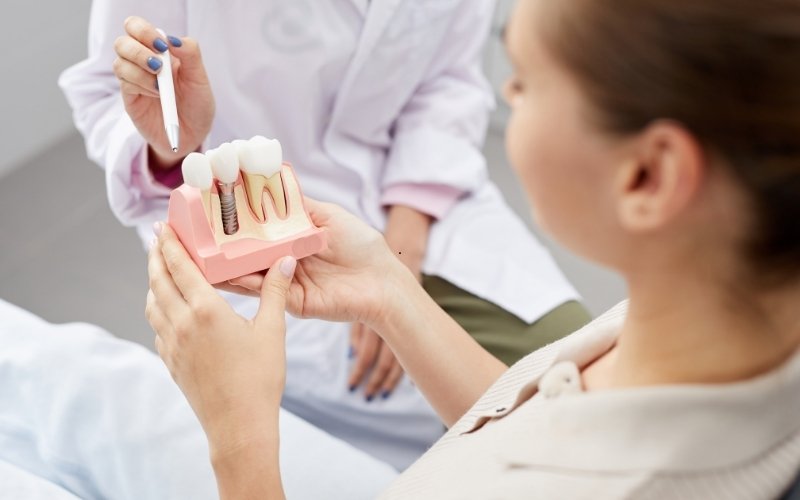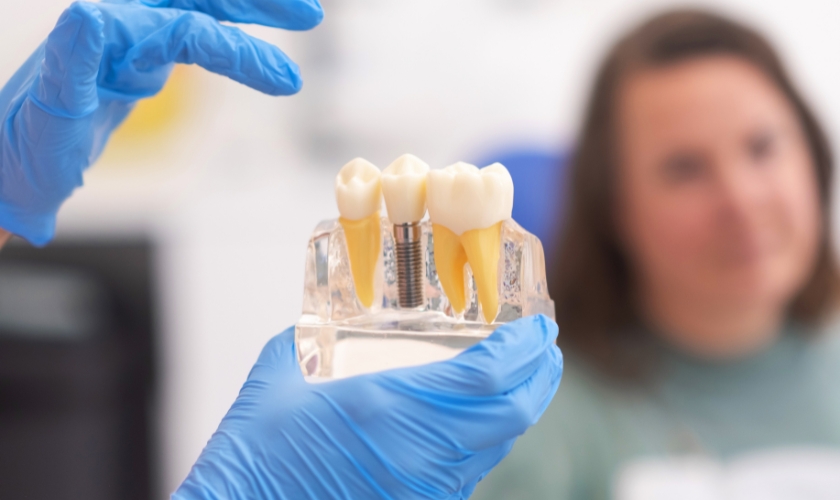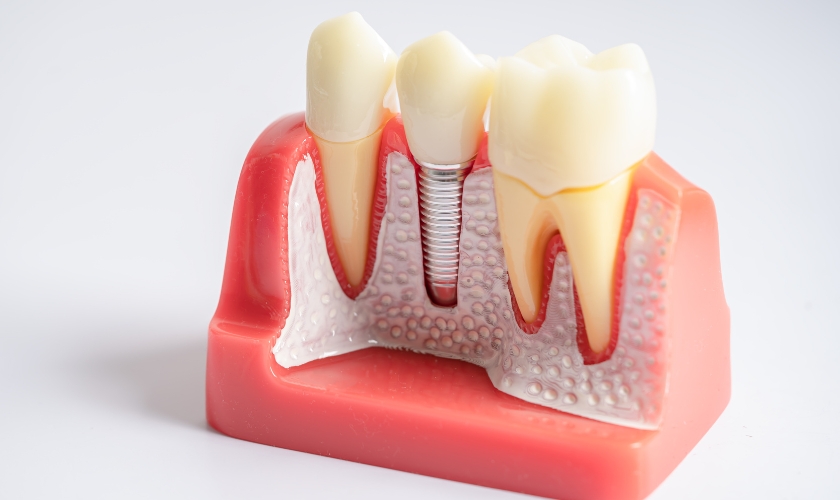
By West Albany Dental
Dental implants are a popular and effective solution for replacing missing teeth. These implants consist of titanium posts placed into the jawbone, acting as artificial tooth roots. A crown is then placed on top to mimic the natural tooth, restoring function and appearance.
Implants are vital because they support chewing, preserve facial structure, and boost confidence. However, to ensure these benefits last a lifetime, proper care and maintenance are essential.
This blog will explore how to make implants last longer. From proper oral hygiene to lifestyle changes, you will learn practical tips to extend the lifespan of your implants and enjoy their full benefits for years to come.
Understanding Dental Implants
What Are Dental Implants?
Implants are advanced tooth replacement options designed to function and look like natural teeth. The implant consists of three main components: the titanium post, abutment, and crown.
- Implant Post: This is the titanium post that acts as the artificial tooth root. It is surgically placed into the jawbone and, over time, fuses with the bone in a process called osseointegration. This fusion provides a stable foundation for the new tooth.
- Abutment: Once the implant has integrated with the jawbone, an abutment is attached to the post. The abutment serves as the connection between the implant and the crown.
- Crown: Finally, a custom-made crown is placed on top of the abutment. The crown matches the shape, color, and size of your natural teeth, ensuring a seamless appearance.
How Long Do Dental Implants Typically Last?
Implants can last for decades when properly cared for. With excellent oral hygiene and regular dental visits, they may even last a lifetime. However, the average lifespan of an implant typically ranges between 15 to 25 years.
Several factors influence how long your dental implant will last:
- Oral Hygiene: Poor oral care can lead to plaque buildup and infections, such as peri-implantitis, which can threaten the implant’s stability.
- Lifestyle Choices: Smoking, excessive alcohol consumption, and a poor diet can negatively affect the health of your implants.
- Bone Health: Implants need a strong and healthy jawbone for support. If bone density decreases over time, the implant may lose stability.
Understanding these factors allows you to make informed decisions about your dental implant care and ensures they last as long as possible.
Tips to Make Dental Implants Last Longer
1. Maintain Excellent Oral Hygiene
Good oral hygiene is essential to keep your implants and surrounding gums healthy. Brush your teeth twice daily and floss at least once a day.
Focus on the area around your dental implant to prevent plaque buildup, which can lead to gum disease. Consider using an electric toothbrush for more effective cleaning. A water flosser can also help remove debris from hard-to-reach areas around the implant.
2. Visit Your Dentist Regularly
Regular dental visits are crucial for implant maintenance. Schedule check-ups and cleanings every six months. During these visits, your dentist can spot early signs of infection or implant complications, such as peri-implantitis, a condition that causes inflammation around the implant.
In follow-up appointments, your dentist will assess the implant’s stability and ensure that the surrounding gum tissue is healthy. This proactive approach helps extend the lifespan of your implant.
3. Avoid Harmful Habits
Certain habits can compromise the health of your implants. Smoking, for example, slows the healing process and increases the risk of gum disease, which can weaken the implant. Avoid excessive alcohol consumption, as it may interfere with proper healing and bone health.
Additionally, do not use your teeth as tools. Opening bottles or packages with them puts unnecessary pressure on your implants and can cause damage over time.
4. Manage Teeth Grinding and Clenching (Bruxism)
Teeth grinding and clenching, also known as bruxism, can wear down your implants. Over time, the excessive force applied to the implants may lead to fractures or loosening.
If you grind your teeth, wear a mouthguard at night to protect both your implants and natural teeth. Consult with your dentist for further advice on managing bruxism effectively.
5. Maintain a Healthy Diet
A balanced diet supports both your oral and overall health. Calcium and vitamin D are essential for maintaining healthy bones, which are vital for supporting implants. Include dairy products, leafy greens, and fatty fish in your diet.
Avoid hard and sticky foods that could damage your implants or cause the crown to crack. Foods like nuts, ice, and caramel should be consumed with caution, as they can put excessive pressure on the implant.
6. Avoid Overloading the Implant
Overloading occurs when too much force is applied to the implant, usually from chewing hard foods or clenching your teeth. This can damage the implant and affect its long-term stability.
To prevent overloading, avoid using your implant to bite or chew hard objects, like pens or ice. If you have multiple missing teeth, consider replacing them with multiple implants instead of relying on a single one to bear all the pressure.
7. Care for Surrounding Gum Tissue
Healthy gums are essential for supporting dental implants. Without proper care, gum disease can develop and lead to implant failure. To prevent gum disease, gently brush and floss around the implant area daily, paying extra attention to the gumline.
Using an antimicrobial mouthwash can also help reduce bacteria that may cause infections around the implant. If you notice any redness, swelling, or bleeding near the implant, see your dentist right away to address the issue.
Signs Your Dental Implant Needs Attention
1. Warning Signs of Implant Failure
Watch for warning signs that may indicate problems with your dental implant. If you experience pain, swelling, or notice that the implant feels loose, these could be early signs of implant failure. You might also notice bleeding or discomfort around the gumline.
2. What to Do If You Notice Symptoms?
If you notice any of the above symptoms, schedule an appointment with your dentist immediately. Early intervention can often prevent more severe problems and help save your implant. Your dentist will examine the implant and recommend the appropriate treatment, such as a cleaning or minor repair.
3. How Early Intervention Can Prevent Bigger Problems?
Acting quickly when you notice any signs of implant trouble is crucial. Early treatment can prevent the infection from spreading or the implant from loosening further. Waiting too long may require more invasive procedures, such as bone grafting or even implant replacement.
In conclusion, making implants last longer comes down to proper care and lifestyle habits. Maintaining excellent oral hygiene, visiting your dentist regularly, and avoiding harmful habits are critical for implant longevity. Managing teeth grinding and eating a healthy diet also play essential roles.
Consistency is key. By following these tips and seeking early intervention when needed, you can enjoy the full benefits of your dental implants for many years. Always consult your dentist for personalized advice to ensure the health of your implants.








